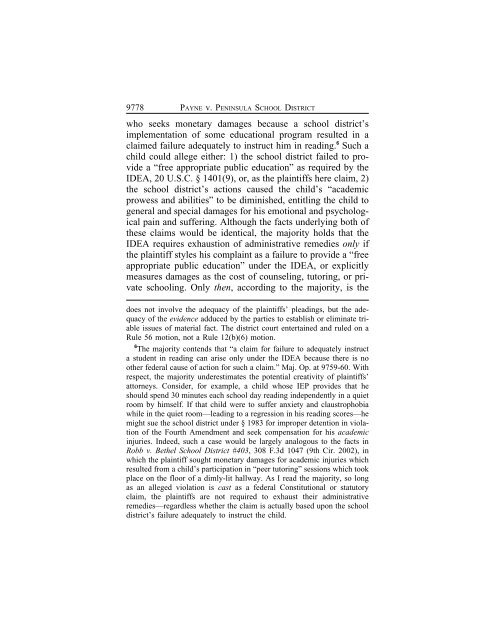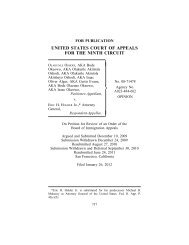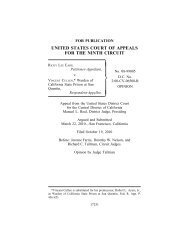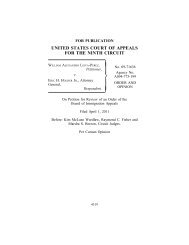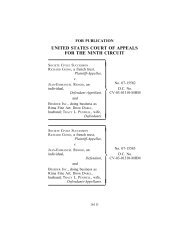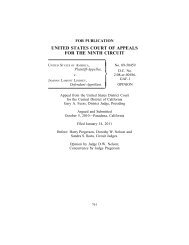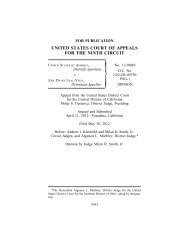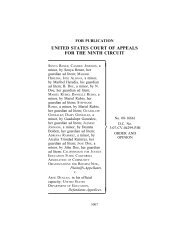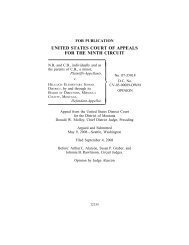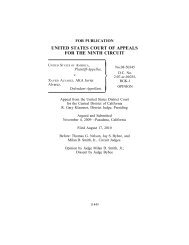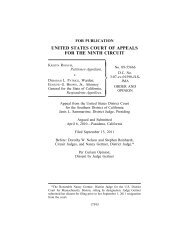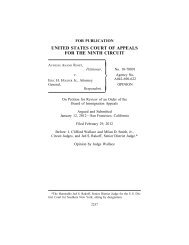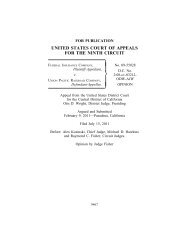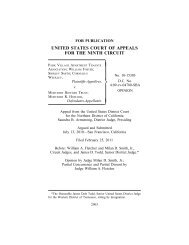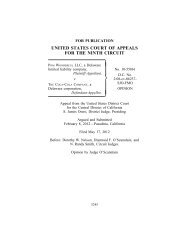UNITED STATES COURT OF APPEALS FOR THE NINTH CIRCUIT
UNITED STATES COURT OF APPEALS FOR THE NINTH CIRCUIT
UNITED STATES COURT OF APPEALS FOR THE NINTH CIRCUIT
Create successful ePaper yourself
Turn your PDF publications into a flip-book with our unique Google optimized e-Paper software.
9778 PAYNE v. PENINSULA SCHOOL DISTRICT<br />
who seeks monetary damages because a school district’s<br />
implementation of some educational program resulted in a<br />
claimed failure adequately to instruct him in reading. 6 Such a<br />
child could allege either: 1) the school district failed to provide<br />
a “free appropriate public education” as required by the<br />
IDEA, 20 U.S.C. § 1401(9), or, as the plaintiffs here claim, 2)<br />
the school district’s actions caused the child’s “academic<br />
prowess and abilities” to be diminished, entitling the child to<br />
general and special damages for his emotional and psychological<br />
pain and suffering. Although the facts underlying both of<br />
these claims would be identical, the majority holds that the<br />
IDEA requires exhaustion of administrative remedies only if<br />
the plaintiff styles his complaint as a failure to provide a “free<br />
appropriate public education” under the IDEA, or explicitly<br />
measures damages as the cost of counseling, tutoring, or private<br />
schooling. Only then, according to the majority, is the<br />
does not involve the adequacy of the plaintiffs’ pleadings, but the adequacy<br />
of the evidence adduced by the parties to establish or eliminate triable<br />
issues of material fact. The district court entertained and ruled on a<br />
Rule 56 motion, not a Rule 12(b)(6) motion.<br />
6 The majority contends that “a claim for failure to adequately instruct<br />
a student in reading can arise only under the IDEA because there is no<br />
other federal cause of action for such a claim.” Maj. Op. at 9759-60. With<br />
respect, the majority underestimates the potential creativity of plaintiffs’<br />
attorneys. Consider, for example, a child whose IEP provides that he<br />
should spend 30 minutes each school day reading independently in a quiet<br />
room by himself. If that child were to suffer anxiety and claustrophobia<br />
while in the quiet room—leading to a regression in his reading scores—he<br />
might sue the school district under § 1983 for improper detention in violation<br />
of the Fourth Amendment and seek compensation for his academic<br />
injuries. Indeed, such a case would be largely analogous to the facts in<br />
Robb v. Bethel School District #403, 308 F.3d 1047 (9th Cir. 2002), in<br />
which the plaintiff sought monetary damages for academic injuries which<br />
resulted from a child’s participation in “peer tutoring” sessions which took<br />
place on the floor of a dimly-lit hallway. As I read the majority, so long<br />
as an alleged violation is cast as a federal Constitutional or statutory<br />
claim, the plaintiffs are not required to exhaust their administrative<br />
remedies—regardless whether the claim is actually based upon the school<br />
district’s failure adequately to instruct the child.


